INF80042 Assignment 4: Analyzing Social Media Strategies for SMEs
VerifiedAdded on 2023/06/03
|12
|4306
|358
Report
AI Summary
This report delves into the critical role of social media in the modern business landscape, particularly for Small and Medium Enterprises (SMEs). It highlights how social media platforms have become essential marketing tools, enabling businesses to reach a large audience efficiently. The report focuses on the hotel industry, examining how SMEs within this sector utilize social media for marketing campaigns. It analyzes the advantages and disadvantages of using social media platforms, providing insights into the challenges faced and the opportunities presented. The report also explores various aspects, including the use of technology in SMEs, the importance of cultural marketing, and personalized marketing strategies. Furthermore, it provides recommendations for effectively leveraging social media in SMEs and includes relevant case studies to illustrate real-world applications and outcomes. The report emphasizes the importance of understanding customer behavior and the need for constant monitoring of social media campaigns to mitigate risks and maximize benefits.
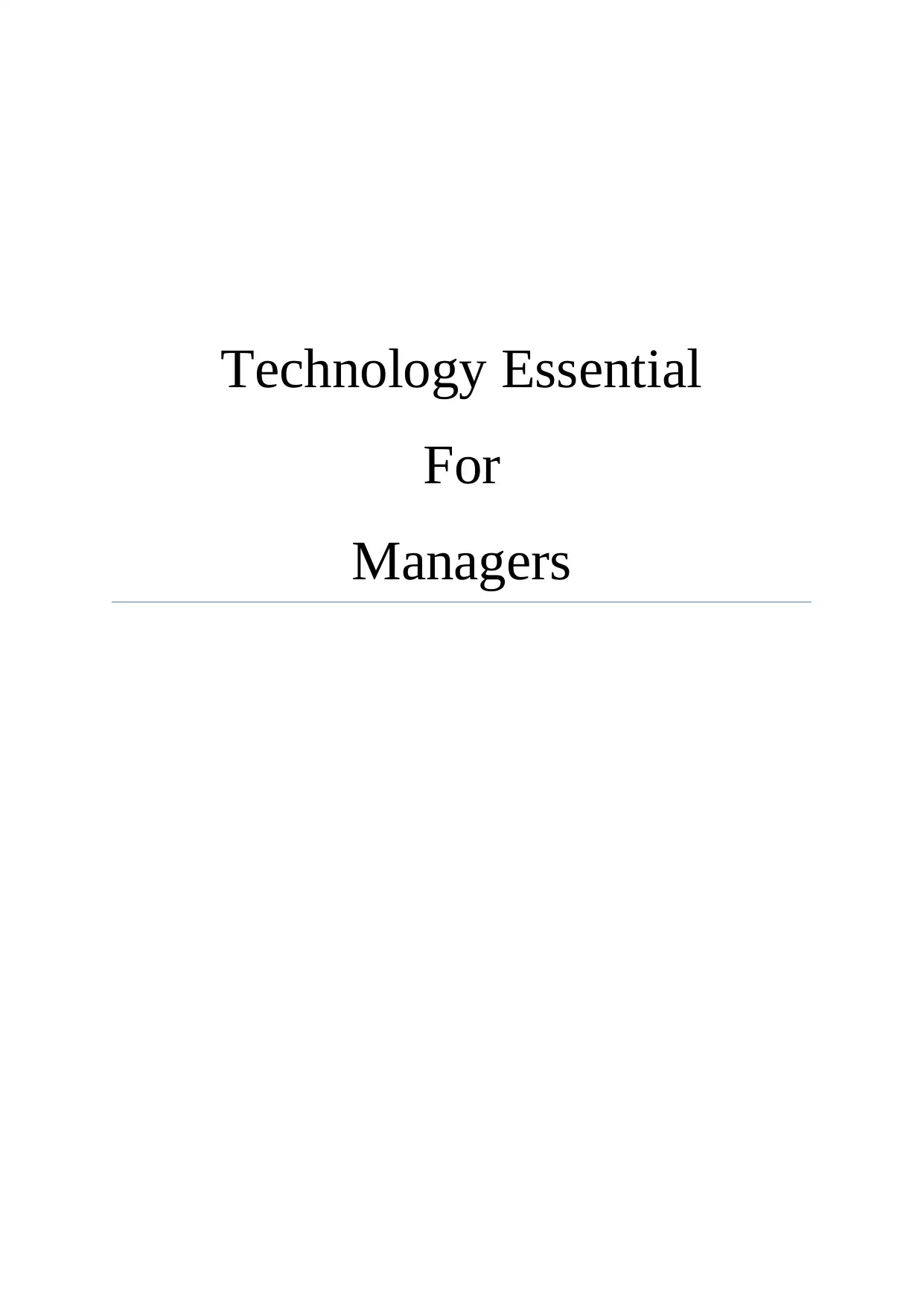
Technology Essential
For
Managers
For
Managers
Paraphrase This Document
Need a fresh take? Get an instant paraphrase of this document with our AI Paraphraser
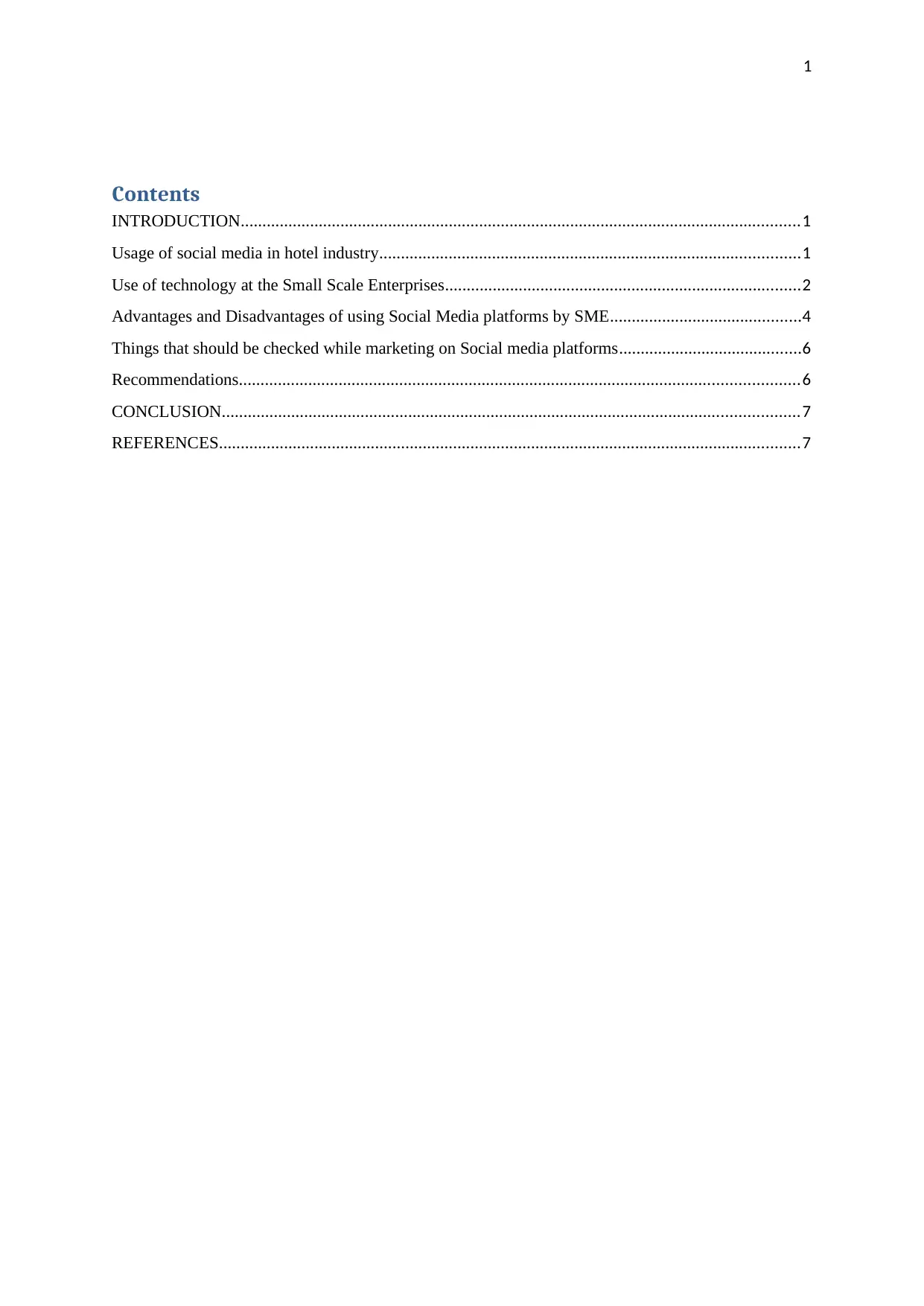
1
Contents
INTRODUCTION.................................................................................................................................1
Usage of social media in hotel industry.................................................................................................1
Use of technology at the Small Scale Enterprises..................................................................................2
Advantages and Disadvantages of using Social Media platforms by SME............................................4
Things that should be checked while marketing on Social media platforms..........................................6
Recommendations.................................................................................................................................6
CONCLUSION.....................................................................................................................................7
REFERENCES......................................................................................................................................7
Contents
INTRODUCTION.................................................................................................................................1
Usage of social media in hotel industry.................................................................................................1
Use of technology at the Small Scale Enterprises..................................................................................2
Advantages and Disadvantages of using Social Media platforms by SME............................................4
Things that should be checked while marketing on Social media platforms..........................................6
Recommendations.................................................................................................................................6
CONCLUSION.....................................................................................................................................7
REFERENCES......................................................................................................................................7
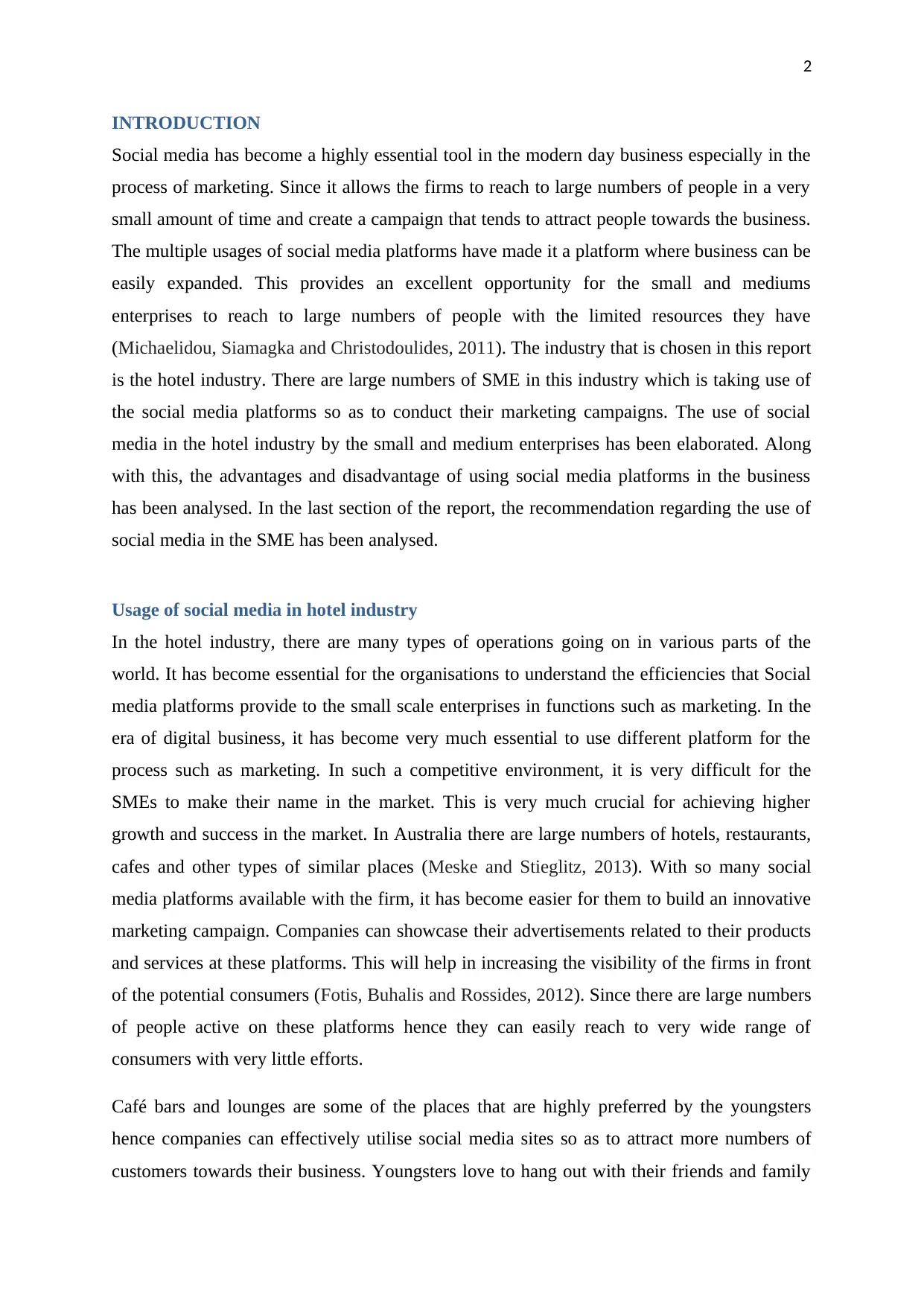
2
INTRODUCTION
Social media has become a highly essential tool in the modern day business especially in the
process of marketing. Since it allows the firms to reach to large numbers of people in a very
small amount of time and create a campaign that tends to attract people towards the business.
The multiple usages of social media platforms have made it a platform where business can be
easily expanded. This provides an excellent opportunity for the small and mediums
enterprises to reach to large numbers of people with the limited resources they have
(Michaelidou, Siamagka and Christodoulides, 2011). The industry that is chosen in this report
is the hotel industry. There are large numbers of SME in this industry which is taking use of
the social media platforms so as to conduct their marketing campaigns. The use of social
media in the hotel industry by the small and medium enterprises has been elaborated. Along
with this, the advantages and disadvantage of using social media platforms in the business
has been analysed. In the last section of the report, the recommendation regarding the use of
social media in the SME has been analysed.
Usage of social media in hotel industry
In the hotel industry, there are many types of operations going on in various parts of the
world. It has become essential for the organisations to understand the efficiencies that Social
media platforms provide to the small scale enterprises in functions such as marketing. In the
era of digital business, it has become very much essential to use different platform for the
process such as marketing. In such a competitive environment, it is very difficult for the
SMEs to make their name in the market. This is very much crucial for achieving higher
growth and success in the market. In Australia there are large numbers of hotels, restaurants,
cafes and other types of similar places (Meske and Stieglitz, 2013). With so many social
media platforms available with the firm, it has become easier for them to build an innovative
marketing campaign. Companies can showcase their advertisements related to their products
and services at these platforms. This will help in increasing the visibility of the firms in front
of the potential consumers (Fotis, Buhalis and Rossides, 2012). Since there are large numbers
of people active on these platforms hence they can easily reach to very wide range of
consumers with very little efforts.
Café bars and lounges are some of the places that are highly preferred by the youngsters
hence companies can effectively utilise social media sites so as to attract more numbers of
customers towards their business. Youngsters love to hang out with their friends and family
INTRODUCTION
Social media has become a highly essential tool in the modern day business especially in the
process of marketing. Since it allows the firms to reach to large numbers of people in a very
small amount of time and create a campaign that tends to attract people towards the business.
The multiple usages of social media platforms have made it a platform where business can be
easily expanded. This provides an excellent opportunity for the small and mediums
enterprises to reach to large numbers of people with the limited resources they have
(Michaelidou, Siamagka and Christodoulides, 2011). The industry that is chosen in this report
is the hotel industry. There are large numbers of SME in this industry which is taking use of
the social media platforms so as to conduct their marketing campaigns. The use of social
media in the hotel industry by the small and medium enterprises has been elaborated. Along
with this, the advantages and disadvantage of using social media platforms in the business
has been analysed. In the last section of the report, the recommendation regarding the use of
social media in the SME has been analysed.
Usage of social media in hotel industry
In the hotel industry, there are many types of operations going on in various parts of the
world. It has become essential for the organisations to understand the efficiencies that Social
media platforms provide to the small scale enterprises in functions such as marketing. In the
era of digital business, it has become very much essential to use different platform for the
process such as marketing. In such a competitive environment, it is very difficult for the
SMEs to make their name in the market. This is very much crucial for achieving higher
growth and success in the market. In Australia there are large numbers of hotels, restaurants,
cafes and other types of similar places (Meske and Stieglitz, 2013). With so many social
media platforms available with the firm, it has become easier for them to build an innovative
marketing campaign. Companies can showcase their advertisements related to their products
and services at these platforms. This will help in increasing the visibility of the firms in front
of the potential consumers (Fotis, Buhalis and Rossides, 2012). Since there are large numbers
of people active on these platforms hence they can easily reach to very wide range of
consumers with very little efforts.
Café bars and lounges are some of the places that are highly preferred by the youngsters
hence companies can effectively utilise social media sites so as to attract more numbers of
customers towards their business. Youngsters love to hang out with their friends and family
⊘ This is a preview!⊘
Do you want full access?
Subscribe today to unlock all pages.

Trusted by 1+ million students worldwide
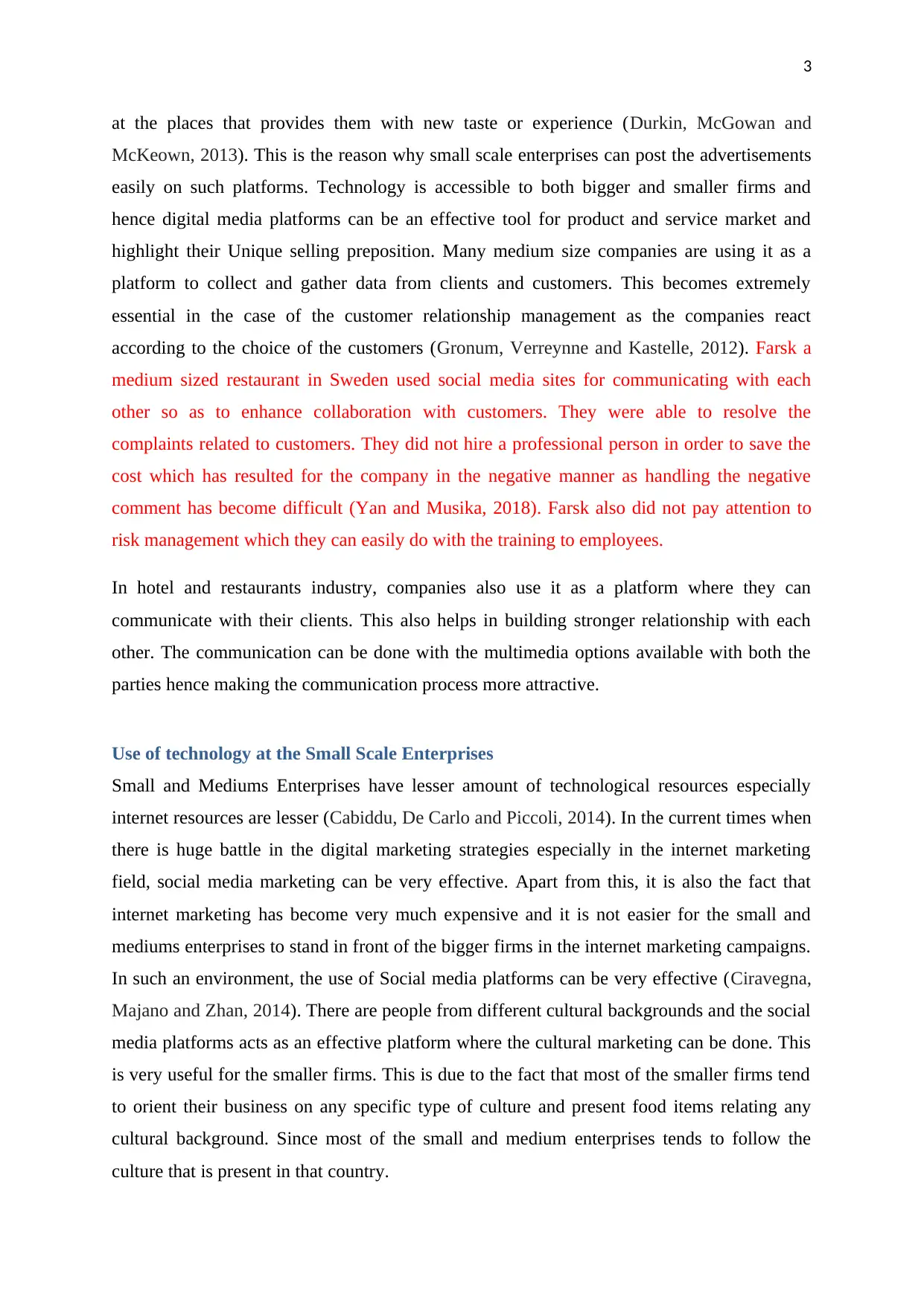
3
at the places that provides them with new taste or experience (Durkin, McGowan and
McKeown, 2013). This is the reason why small scale enterprises can post the advertisements
easily on such platforms. Technology is accessible to both bigger and smaller firms and
hence digital media platforms can be an effective tool for product and service market and
highlight their Unique selling preposition. Many medium size companies are using it as a
platform to collect and gather data from clients and customers. This becomes extremely
essential in the case of the customer relationship management as the companies react
according to the choice of the customers (Gronum, Verreynne and Kastelle, 2012). Farsk a
medium sized restaurant in Sweden used social media sites for communicating with each
other so as to enhance collaboration with customers. They were able to resolve the
complaints related to customers. They did not hire a professional person in order to save the
cost which has resulted for the company in the negative manner as handling the negative
comment has become difficult (Yan and Musika, 2018). Farsk also did not pay attention to
risk management which they can easily do with the training to employees.
In hotel and restaurants industry, companies also use it as a platform where they can
communicate with their clients. This also helps in building stronger relationship with each
other. The communication can be done with the multimedia options available with both the
parties hence making the communication process more attractive.
Use of technology at the Small Scale Enterprises
Small and Mediums Enterprises have lesser amount of technological resources especially
internet resources are lesser (Cabiddu, De Carlo and Piccoli, 2014). In the current times when
there is huge battle in the digital marketing strategies especially in the internet marketing
field, social media marketing can be very effective. Apart from this, it is also the fact that
internet marketing has become very much expensive and it is not easier for the small and
mediums enterprises to stand in front of the bigger firms in the internet marketing campaigns.
In such an environment, the use of Social media platforms can be very effective (Ciravegna,
Majano and Zhan, 2014). There are people from different cultural backgrounds and the social
media platforms acts as an effective platform where the cultural marketing can be done. This
is very useful for the smaller firms. This is due to the fact that most of the smaller firms tend
to orient their business on any specific type of culture and present food items relating any
cultural background. Since most of the small and medium enterprises tends to follow the
culture that is present in that country.
at the places that provides them with new taste or experience (Durkin, McGowan and
McKeown, 2013). This is the reason why small scale enterprises can post the advertisements
easily on such platforms. Technology is accessible to both bigger and smaller firms and
hence digital media platforms can be an effective tool for product and service market and
highlight their Unique selling preposition. Many medium size companies are using it as a
platform to collect and gather data from clients and customers. This becomes extremely
essential in the case of the customer relationship management as the companies react
according to the choice of the customers (Gronum, Verreynne and Kastelle, 2012). Farsk a
medium sized restaurant in Sweden used social media sites for communicating with each
other so as to enhance collaboration with customers. They were able to resolve the
complaints related to customers. They did not hire a professional person in order to save the
cost which has resulted for the company in the negative manner as handling the negative
comment has become difficult (Yan and Musika, 2018). Farsk also did not pay attention to
risk management which they can easily do with the training to employees.
In hotel and restaurants industry, companies also use it as a platform where they can
communicate with their clients. This also helps in building stronger relationship with each
other. The communication can be done with the multimedia options available with both the
parties hence making the communication process more attractive.
Use of technology at the Small Scale Enterprises
Small and Mediums Enterprises have lesser amount of technological resources especially
internet resources are lesser (Cabiddu, De Carlo and Piccoli, 2014). In the current times when
there is huge battle in the digital marketing strategies especially in the internet marketing
field, social media marketing can be very effective. Apart from this, it is also the fact that
internet marketing has become very much expensive and it is not easier for the small and
mediums enterprises to stand in front of the bigger firms in the internet marketing campaigns.
In such an environment, the use of Social media platforms can be very effective (Ciravegna,
Majano and Zhan, 2014). There are people from different cultural backgrounds and the social
media platforms acts as an effective platform where the cultural marketing can be done. This
is very useful for the smaller firms. This is due to the fact that most of the smaller firms tend
to orient their business on any specific type of culture and present food items relating any
cultural background. Since most of the small and medium enterprises tends to follow the
culture that is present in that country.
Paraphrase This Document
Need a fresh take? Get an instant paraphrase of this document with our AI Paraphraser
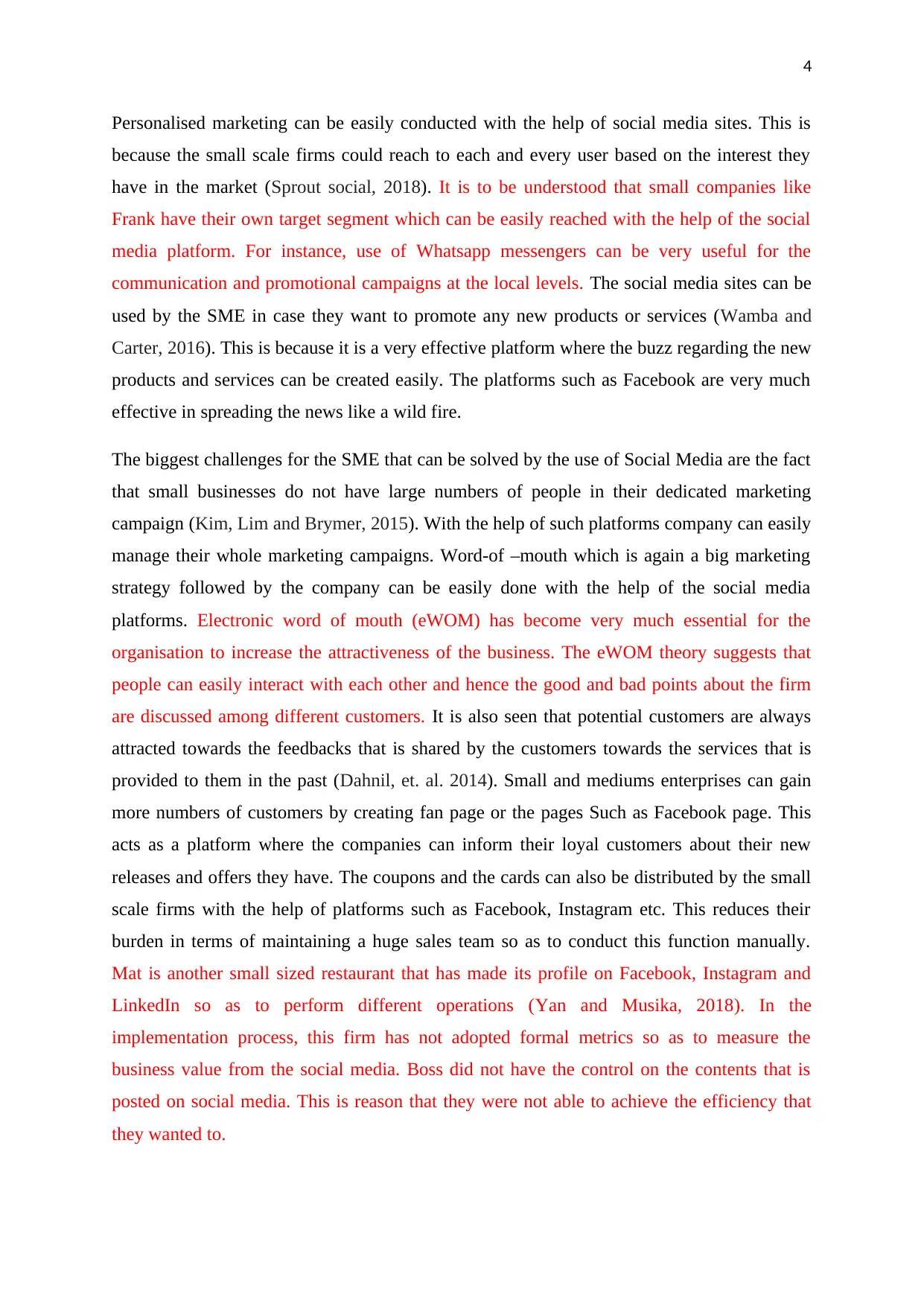
4
Personalised marketing can be easily conducted with the help of social media sites. This is
because the small scale firms could reach to each and every user based on the interest they
have in the market (Sprout social, 2018). It is to be understood that small companies like
Frank have their own target segment which can be easily reached with the help of the social
media platform. For instance, use of Whatsapp messengers can be very useful for the
communication and promotional campaigns at the local levels. The social media sites can be
used by the SME in case they want to promote any new products or services (Wamba and
Carter, 2016). This is because it is a very effective platform where the buzz regarding the new
products and services can be created easily. The platforms such as Facebook are very much
effective in spreading the news like a wild fire.
The biggest challenges for the SME that can be solved by the use of Social Media are the fact
that small businesses do not have large numbers of people in their dedicated marketing
campaign (Kim, Lim and Brymer, 2015). With the help of such platforms company can easily
manage their whole marketing campaigns. Word-of –mouth which is again a big marketing
strategy followed by the company can be easily done with the help of the social media
platforms. Electronic word of mouth (eWOM) has become very much essential for the
organisation to increase the attractiveness of the business. The eWOM theory suggests that
people can easily interact with each other and hence the good and bad points about the firm
are discussed among different customers. It is also seen that potential customers are always
attracted towards the feedbacks that is shared by the customers towards the services that is
provided to them in the past (Dahnil, et. al. 2014). Small and mediums enterprises can gain
more numbers of customers by creating fan page or the pages Such as Facebook page. This
acts as a platform where the companies can inform their loyal customers about their new
releases and offers they have. The coupons and the cards can also be distributed by the small
scale firms with the help of platforms such as Facebook, Instagram etc. This reduces their
burden in terms of maintaining a huge sales team so as to conduct this function manually.
Mat is another small sized restaurant that has made its profile on Facebook, Instagram and
LinkedIn so as to perform different operations (Yan and Musika, 2018). In the
implementation process, this firm has not adopted formal metrics so as to measure the
business value from the social media. Boss did not have the control on the contents that is
posted on social media. This is reason that they were not able to achieve the efficiency that
they wanted to.
Personalised marketing can be easily conducted with the help of social media sites. This is
because the small scale firms could reach to each and every user based on the interest they
have in the market (Sprout social, 2018). It is to be understood that small companies like
Frank have their own target segment which can be easily reached with the help of the social
media platform. For instance, use of Whatsapp messengers can be very useful for the
communication and promotional campaigns at the local levels. The social media sites can be
used by the SME in case they want to promote any new products or services (Wamba and
Carter, 2016). This is because it is a very effective platform where the buzz regarding the new
products and services can be created easily. The platforms such as Facebook are very much
effective in spreading the news like a wild fire.
The biggest challenges for the SME that can be solved by the use of Social Media are the fact
that small businesses do not have large numbers of people in their dedicated marketing
campaign (Kim, Lim and Brymer, 2015). With the help of such platforms company can easily
manage their whole marketing campaigns. Word-of –mouth which is again a big marketing
strategy followed by the company can be easily done with the help of the social media
platforms. Electronic word of mouth (eWOM) has become very much essential for the
organisation to increase the attractiveness of the business. The eWOM theory suggests that
people can easily interact with each other and hence the good and bad points about the firm
are discussed among different customers. It is also seen that potential customers are always
attracted towards the feedbacks that is shared by the customers towards the services that is
provided to them in the past (Dahnil, et. al. 2014). Small and mediums enterprises can gain
more numbers of customers by creating fan page or the pages Such as Facebook page. This
acts as a platform where the companies can inform their loyal customers about their new
releases and offers they have. The coupons and the cards can also be distributed by the small
scale firms with the help of platforms such as Facebook, Instagram etc. This reduces their
burden in terms of maintaining a huge sales team so as to conduct this function manually.
Mat is another small sized restaurant that has made its profile on Facebook, Instagram and
LinkedIn so as to perform different operations (Yan and Musika, 2018). In the
implementation process, this firm has not adopted formal metrics so as to measure the
business value from the social media. Boss did not have the control on the contents that is
posted on social media. This is reason that they were not able to achieve the efficiency that
they wanted to.
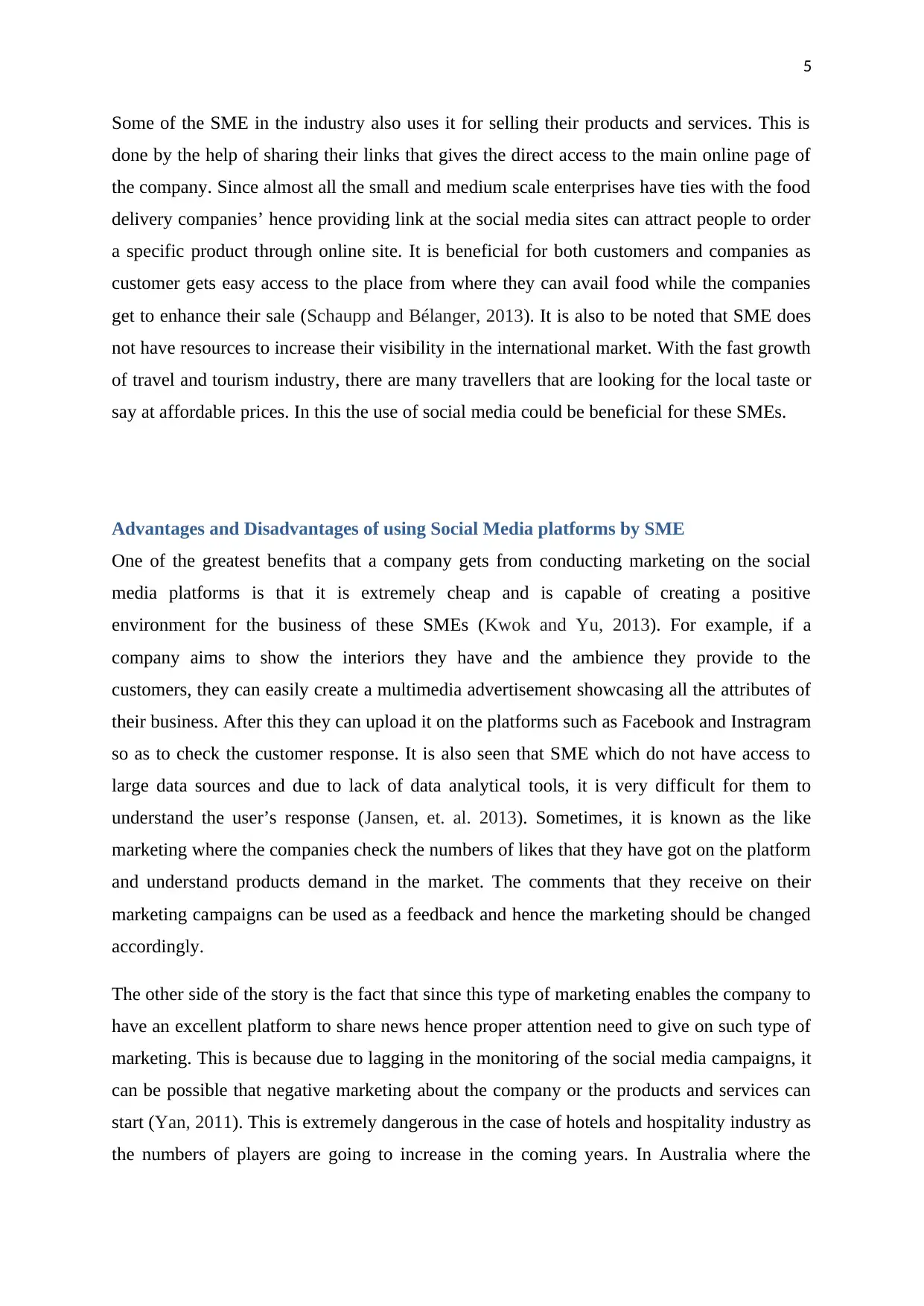
5
Some of the SME in the industry also uses it for selling their products and services. This is
done by the help of sharing their links that gives the direct access to the main online page of
the company. Since almost all the small and medium scale enterprises have ties with the food
delivery companies’ hence providing link at the social media sites can attract people to order
a specific product through online site. It is beneficial for both customers and companies as
customer gets easy access to the place from where they can avail food while the companies
get to enhance their sale (Schaupp and Bélanger, 2013). It is also to be noted that SME does
not have resources to increase their visibility in the international market. With the fast growth
of travel and tourism industry, there are many travellers that are looking for the local taste or
say at affordable prices. In this the use of social media could be beneficial for these SMEs.
Advantages and Disadvantages of using Social Media platforms by SME
One of the greatest benefits that a company gets from conducting marketing on the social
media platforms is that it is extremely cheap and is capable of creating a positive
environment for the business of these SMEs (Kwok and Yu, 2013). For example, if a
company aims to show the interiors they have and the ambience they provide to the
customers, they can easily create a multimedia advertisement showcasing all the attributes of
their business. After this they can upload it on the platforms such as Facebook and Instragram
so as to check the customer response. It is also seen that SME which do not have access to
large data sources and due to lack of data analytical tools, it is very difficult for them to
understand the user’s response (Jansen, et. al. 2013). Sometimes, it is known as the like
marketing where the companies check the numbers of likes that they have got on the platform
and understand products demand in the market. The comments that they receive on their
marketing campaigns can be used as a feedback and hence the marketing should be changed
accordingly.
The other side of the story is the fact that since this type of marketing enables the company to
have an excellent platform to share news hence proper attention need to give on such type of
marketing. This is because due to lagging in the monitoring of the social media campaigns, it
can be possible that negative marketing about the company or the products and services can
start (Yan, 2011). This is extremely dangerous in the case of hotels and hospitality industry as
the numbers of players are going to increase in the coming years. In Australia where the
Some of the SME in the industry also uses it for selling their products and services. This is
done by the help of sharing their links that gives the direct access to the main online page of
the company. Since almost all the small and medium scale enterprises have ties with the food
delivery companies’ hence providing link at the social media sites can attract people to order
a specific product through online site. It is beneficial for both customers and companies as
customer gets easy access to the place from where they can avail food while the companies
get to enhance their sale (Schaupp and Bélanger, 2013). It is also to be noted that SME does
not have resources to increase their visibility in the international market. With the fast growth
of travel and tourism industry, there are many travellers that are looking for the local taste or
say at affordable prices. In this the use of social media could be beneficial for these SMEs.
Advantages and Disadvantages of using Social Media platforms by SME
One of the greatest benefits that a company gets from conducting marketing on the social
media platforms is that it is extremely cheap and is capable of creating a positive
environment for the business of these SMEs (Kwok and Yu, 2013). For example, if a
company aims to show the interiors they have and the ambience they provide to the
customers, they can easily create a multimedia advertisement showcasing all the attributes of
their business. After this they can upload it on the platforms such as Facebook and Instragram
so as to check the customer response. It is also seen that SME which do not have access to
large data sources and due to lack of data analytical tools, it is very difficult for them to
understand the user’s response (Jansen, et. al. 2013). Sometimes, it is known as the like
marketing where the companies check the numbers of likes that they have got on the platform
and understand products demand in the market. The comments that they receive on their
marketing campaigns can be used as a feedback and hence the marketing should be changed
accordingly.
The other side of the story is the fact that since this type of marketing enables the company to
have an excellent platform to share news hence proper attention need to give on such type of
marketing. This is because due to lagging in the monitoring of the social media campaigns, it
can be possible that negative marketing about the company or the products and services can
start (Yan, 2011). This is extremely dangerous in the case of hotels and hospitality industry as
the numbers of players are going to increase in the coming years. In Australia where the
⊘ This is a preview!⊘
Do you want full access?
Subscribe today to unlock all pages.

Trusted by 1+ million students worldwide
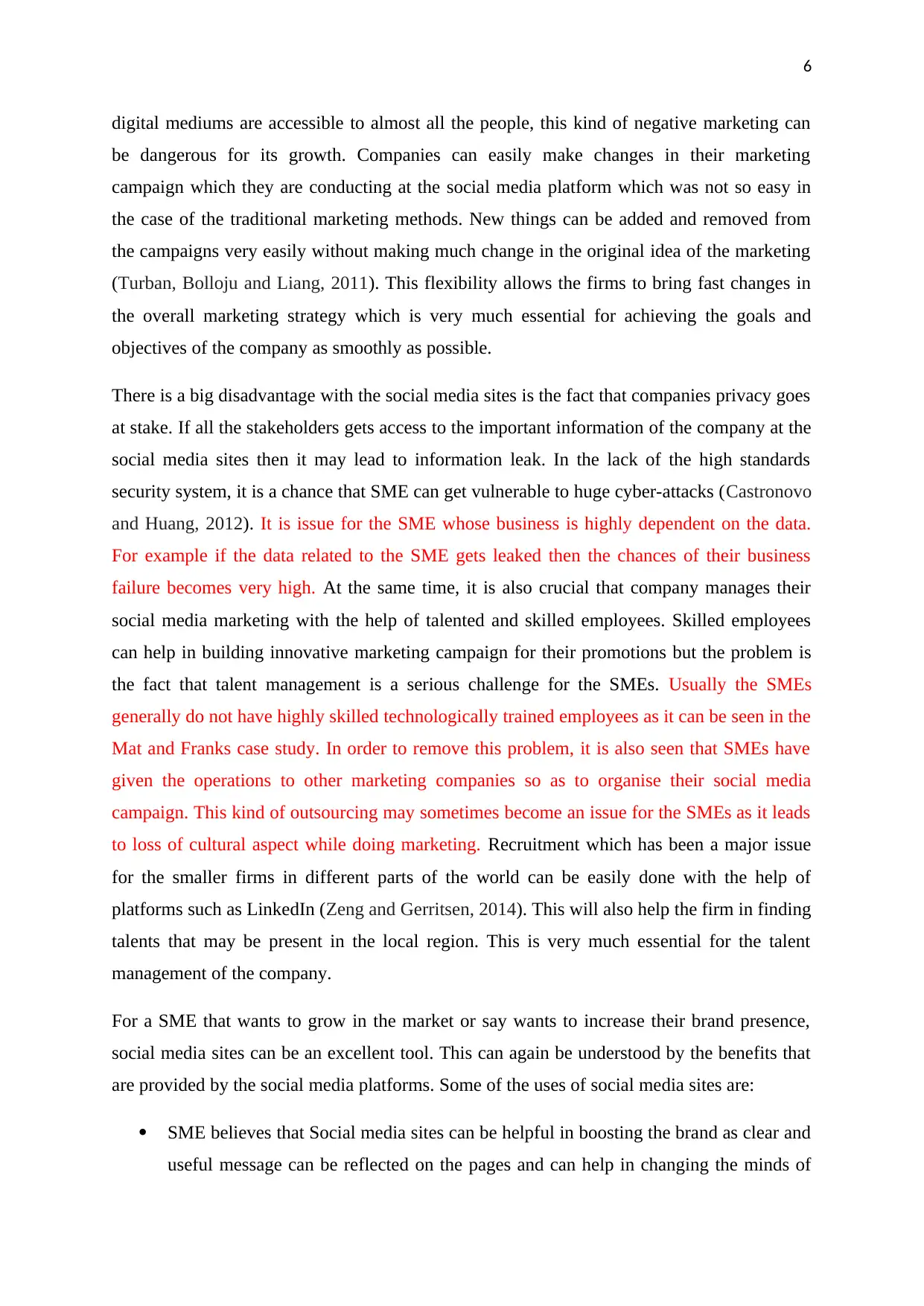
6
digital mediums are accessible to almost all the people, this kind of negative marketing can
be dangerous for its growth. Companies can easily make changes in their marketing
campaign which they are conducting at the social media platform which was not so easy in
the case of the traditional marketing methods. New things can be added and removed from
the campaigns very easily without making much change in the original idea of the marketing
(Turban, Bolloju and Liang, 2011). This flexibility allows the firms to bring fast changes in
the overall marketing strategy which is very much essential for achieving the goals and
objectives of the company as smoothly as possible.
There is a big disadvantage with the social media sites is the fact that companies privacy goes
at stake. If all the stakeholders gets access to the important information of the company at the
social media sites then it may lead to information leak. In the lack of the high standards
security system, it is a chance that SME can get vulnerable to huge cyber-attacks (Castronovo
and Huang, 2012). It is issue for the SME whose business is highly dependent on the data.
For example if the data related to the SME gets leaked then the chances of their business
failure becomes very high. At the same time, it is also crucial that company manages their
social media marketing with the help of talented and skilled employees. Skilled employees
can help in building innovative marketing campaign for their promotions but the problem is
the fact that talent management is a serious challenge for the SMEs. Usually the SMEs
generally do not have highly skilled technologically trained employees as it can be seen in the
Mat and Franks case study. In order to remove this problem, it is also seen that SMEs have
given the operations to other marketing companies so as to organise their social media
campaign. This kind of outsourcing may sometimes become an issue for the SMEs as it leads
to loss of cultural aspect while doing marketing. Recruitment which has been a major issue
for the smaller firms in different parts of the world can be easily done with the help of
platforms such as LinkedIn (Zeng and Gerritsen, 2014). This will also help the firm in finding
talents that may be present in the local region. This is very much essential for the talent
management of the company.
For a SME that wants to grow in the market or say wants to increase their brand presence,
social media sites can be an excellent tool. This can again be understood by the benefits that
are provided by the social media platforms. Some of the uses of social media sites are:
SME believes that Social media sites can be helpful in boosting the brand as clear and
useful message can be reflected on the pages and can help in changing the minds of
digital mediums are accessible to almost all the people, this kind of negative marketing can
be dangerous for its growth. Companies can easily make changes in their marketing
campaign which they are conducting at the social media platform which was not so easy in
the case of the traditional marketing methods. New things can be added and removed from
the campaigns very easily without making much change in the original idea of the marketing
(Turban, Bolloju and Liang, 2011). This flexibility allows the firms to bring fast changes in
the overall marketing strategy which is very much essential for achieving the goals and
objectives of the company as smoothly as possible.
There is a big disadvantage with the social media sites is the fact that companies privacy goes
at stake. If all the stakeholders gets access to the important information of the company at the
social media sites then it may lead to information leak. In the lack of the high standards
security system, it is a chance that SME can get vulnerable to huge cyber-attacks (Castronovo
and Huang, 2012). It is issue for the SME whose business is highly dependent on the data.
For example if the data related to the SME gets leaked then the chances of their business
failure becomes very high. At the same time, it is also crucial that company manages their
social media marketing with the help of talented and skilled employees. Skilled employees
can help in building innovative marketing campaign for their promotions but the problem is
the fact that talent management is a serious challenge for the SMEs. Usually the SMEs
generally do not have highly skilled technologically trained employees as it can be seen in the
Mat and Franks case study. In order to remove this problem, it is also seen that SMEs have
given the operations to other marketing companies so as to organise their social media
campaign. This kind of outsourcing may sometimes become an issue for the SMEs as it leads
to loss of cultural aspect while doing marketing. Recruitment which has been a major issue
for the smaller firms in different parts of the world can be easily done with the help of
platforms such as LinkedIn (Zeng and Gerritsen, 2014). This will also help the firm in finding
talents that may be present in the local region. This is very much essential for the talent
management of the company.
For a SME that wants to grow in the market or say wants to increase their brand presence,
social media sites can be an excellent tool. This can again be understood by the benefits that
are provided by the social media platforms. Some of the uses of social media sites are:
SME believes that Social media sites can be helpful in boosting the brand as clear and
useful message can be reflected on the pages and can help in changing the minds of
Paraphrase This Document
Need a fresh take? Get an instant paraphrase of this document with our AI Paraphraser
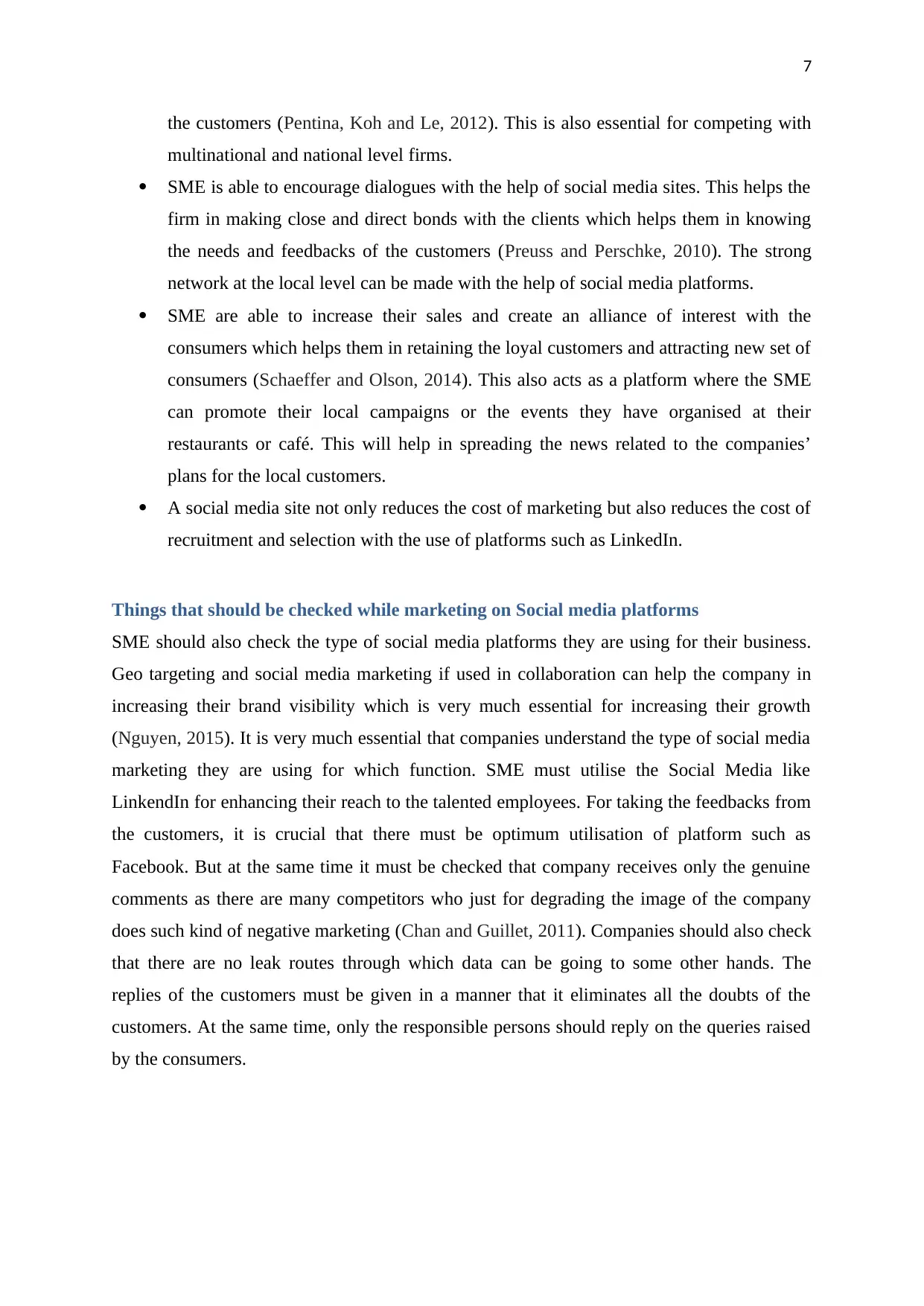
7
the customers (Pentina, Koh and Le, 2012). This is also essential for competing with
multinational and national level firms.
SME is able to encourage dialogues with the help of social media sites. This helps the
firm in making close and direct bonds with the clients which helps them in knowing
the needs and feedbacks of the customers (Preuss and Perschke, 2010). The strong
network at the local level can be made with the help of social media platforms.
SME are able to increase their sales and create an alliance of interest with the
consumers which helps them in retaining the loyal customers and attracting new set of
consumers (Schaeffer and Olson, 2014). This also acts as a platform where the SME
can promote their local campaigns or the events they have organised at their
restaurants or café. This will help in spreading the news related to the companies’
plans for the local customers.
A social media site not only reduces the cost of marketing but also reduces the cost of
recruitment and selection with the use of platforms such as LinkedIn.
Things that should be checked while marketing on Social media platforms
SME should also check the type of social media platforms they are using for their business.
Geo targeting and social media marketing if used in collaboration can help the company in
increasing their brand visibility which is very much essential for increasing their growth
(Nguyen, 2015). It is very much essential that companies understand the type of social media
marketing they are using for which function. SME must utilise the Social Media like
LinkendIn for enhancing their reach to the talented employees. For taking the feedbacks from
the customers, it is crucial that there must be optimum utilisation of platform such as
Facebook. But at the same time it must be checked that company receives only the genuine
comments as there are many competitors who just for degrading the image of the company
does such kind of negative marketing (Chan and Guillet, 2011). Companies should also check
that there are no leak routes through which data can be going to some other hands. The
replies of the customers must be given in a manner that it eliminates all the doubts of the
customers. At the same time, only the responsible persons should reply on the queries raised
by the consumers.
the customers (Pentina, Koh and Le, 2012). This is also essential for competing with
multinational and national level firms.
SME is able to encourage dialogues with the help of social media sites. This helps the
firm in making close and direct bonds with the clients which helps them in knowing
the needs and feedbacks of the customers (Preuss and Perschke, 2010). The strong
network at the local level can be made with the help of social media platforms.
SME are able to increase their sales and create an alliance of interest with the
consumers which helps them in retaining the loyal customers and attracting new set of
consumers (Schaeffer and Olson, 2014). This also acts as a platform where the SME
can promote their local campaigns or the events they have organised at their
restaurants or café. This will help in spreading the news related to the companies’
plans for the local customers.
A social media site not only reduces the cost of marketing but also reduces the cost of
recruitment and selection with the use of platforms such as LinkedIn.
Things that should be checked while marketing on Social media platforms
SME should also check the type of social media platforms they are using for their business.
Geo targeting and social media marketing if used in collaboration can help the company in
increasing their brand visibility which is very much essential for increasing their growth
(Nguyen, 2015). It is very much essential that companies understand the type of social media
marketing they are using for which function. SME must utilise the Social Media like
LinkendIn for enhancing their reach to the talented employees. For taking the feedbacks from
the customers, it is crucial that there must be optimum utilisation of platform such as
Facebook. But at the same time it must be checked that company receives only the genuine
comments as there are many competitors who just for degrading the image of the company
does such kind of negative marketing (Chan and Guillet, 2011). Companies should also check
that there are no leak routes through which data can be going to some other hands. The
replies of the customers must be given in a manner that it eliminates all the doubts of the
customers. At the same time, only the responsible persons should reply on the queries raised
by the consumers.
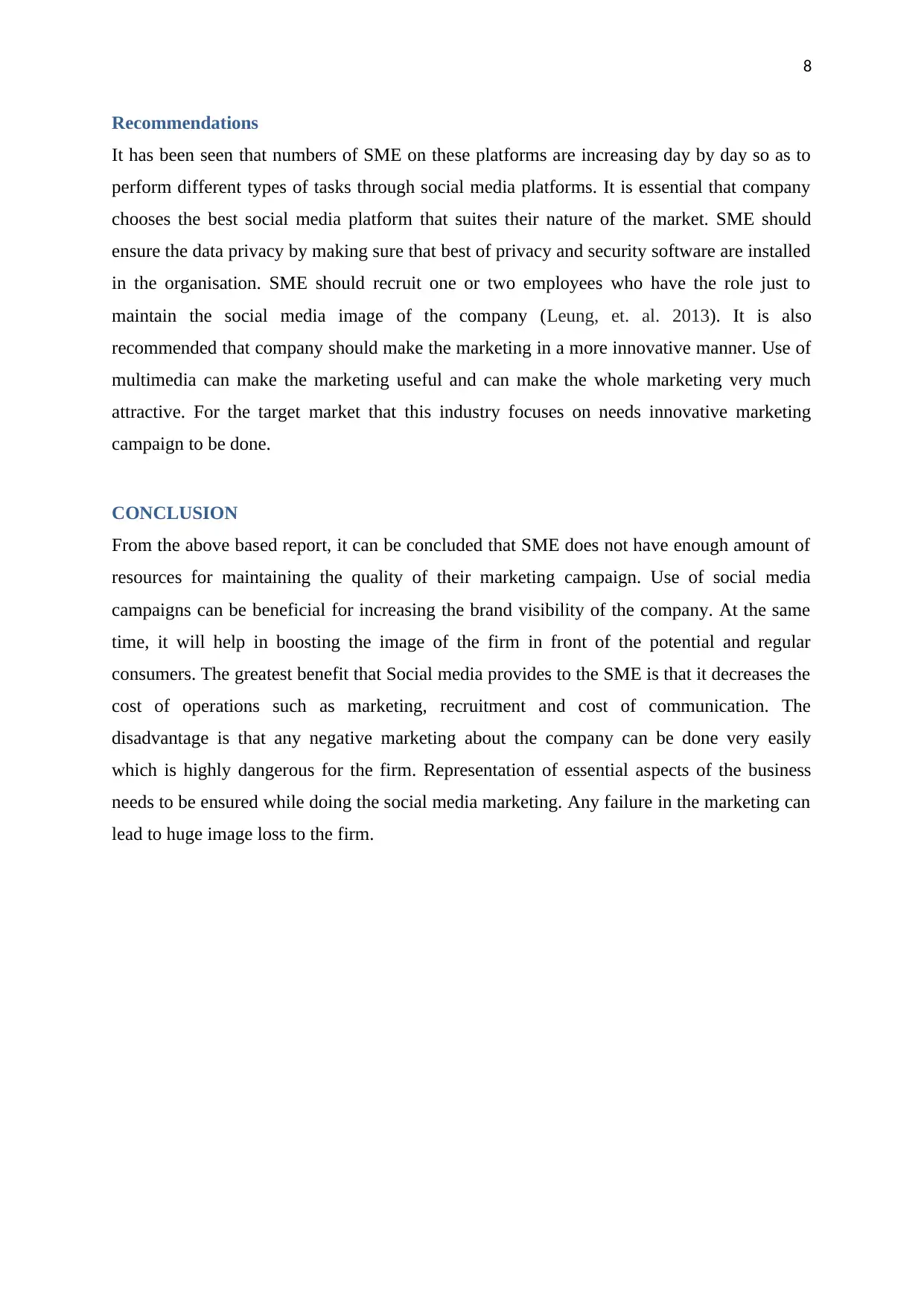
8
Recommendations
It has been seen that numbers of SME on these platforms are increasing day by day so as to
perform different types of tasks through social media platforms. It is essential that company
chooses the best social media platform that suites their nature of the market. SME should
ensure the data privacy by making sure that best of privacy and security software are installed
in the organisation. SME should recruit one or two employees who have the role just to
maintain the social media image of the company (Leung, et. al. 2013). It is also
recommended that company should make the marketing in a more innovative manner. Use of
multimedia can make the marketing useful and can make the whole marketing very much
attractive. For the target market that this industry focuses on needs innovative marketing
campaign to be done.
CONCLUSION
From the above based report, it can be concluded that SME does not have enough amount of
resources for maintaining the quality of their marketing campaign. Use of social media
campaigns can be beneficial for increasing the brand visibility of the company. At the same
time, it will help in boosting the image of the firm in front of the potential and regular
consumers. The greatest benefit that Social media provides to the SME is that it decreases the
cost of operations such as marketing, recruitment and cost of communication. The
disadvantage is that any negative marketing about the company can be done very easily
which is highly dangerous for the firm. Representation of essential aspects of the business
needs to be ensured while doing the social media marketing. Any failure in the marketing can
lead to huge image loss to the firm.
Recommendations
It has been seen that numbers of SME on these platforms are increasing day by day so as to
perform different types of tasks through social media platforms. It is essential that company
chooses the best social media platform that suites their nature of the market. SME should
ensure the data privacy by making sure that best of privacy and security software are installed
in the organisation. SME should recruit one or two employees who have the role just to
maintain the social media image of the company (Leung, et. al. 2013). It is also
recommended that company should make the marketing in a more innovative manner. Use of
multimedia can make the marketing useful and can make the whole marketing very much
attractive. For the target market that this industry focuses on needs innovative marketing
campaign to be done.
CONCLUSION
From the above based report, it can be concluded that SME does not have enough amount of
resources for maintaining the quality of their marketing campaign. Use of social media
campaigns can be beneficial for increasing the brand visibility of the company. At the same
time, it will help in boosting the image of the firm in front of the potential and regular
consumers. The greatest benefit that Social media provides to the SME is that it decreases the
cost of operations such as marketing, recruitment and cost of communication. The
disadvantage is that any negative marketing about the company can be done very easily
which is highly dangerous for the firm. Representation of essential aspects of the business
needs to be ensured while doing the social media marketing. Any failure in the marketing can
lead to huge image loss to the firm.
⊘ This is a preview!⊘
Do you want full access?
Subscribe today to unlock all pages.

Trusted by 1+ million students worldwide
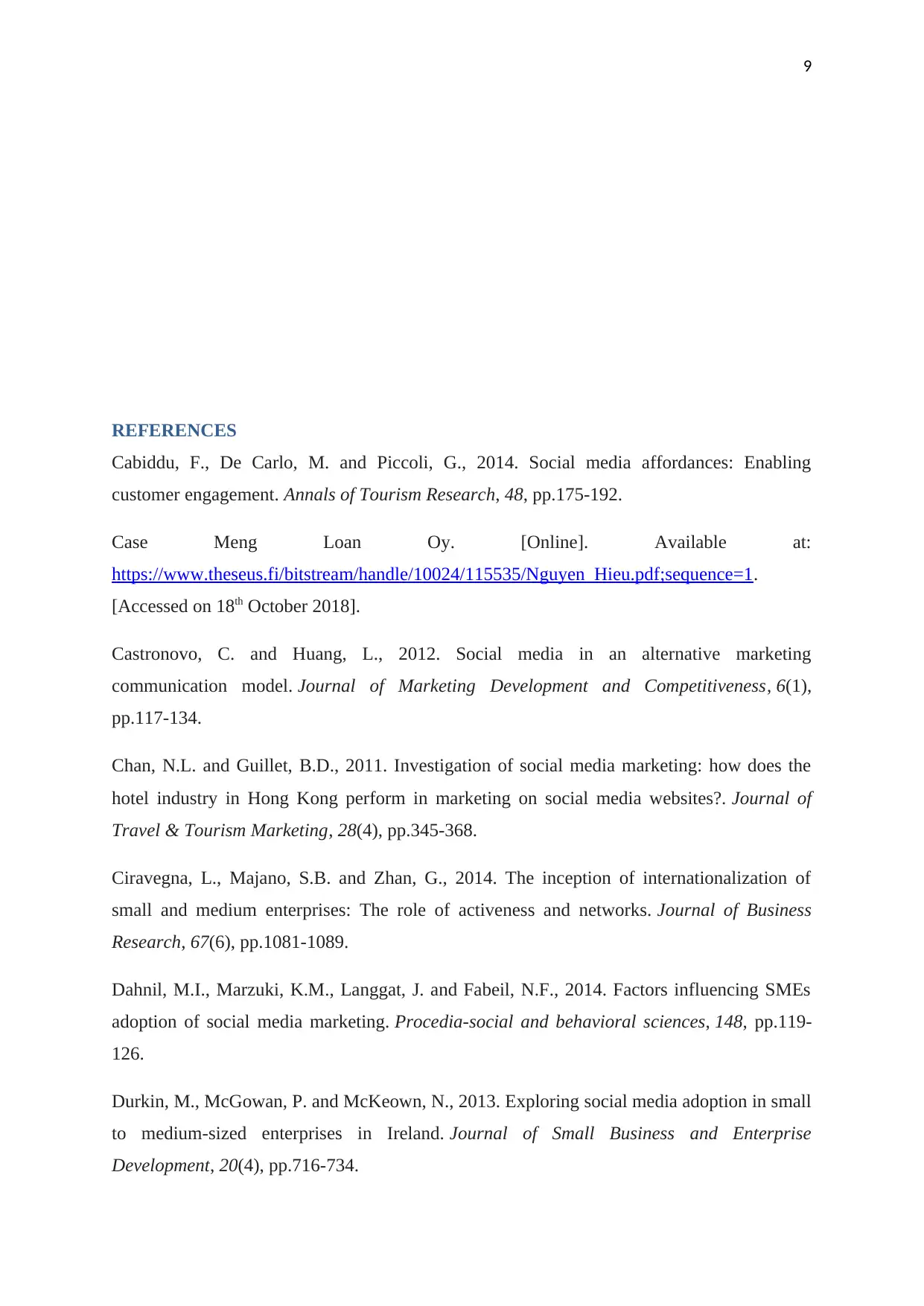
9
REFERENCES
Cabiddu, F., De Carlo, M. and Piccoli, G., 2014. Social media affordances: Enabling
customer engagement. Annals of Tourism Research, 48, pp.175-192.
Case Meng Loan Oy. [Online]. Available at:
https://www.theseus.fi/bitstream/handle/10024/115535/Nguyen_Hieu.pdf;sequence=1.
[Accessed on 18th October 2018].
Castronovo, C. and Huang, L., 2012. Social media in an alternative marketing
communication model. Journal of Marketing Development and Competitiveness, 6(1),
pp.117-134.
Chan, N.L. and Guillet, B.D., 2011. Investigation of social media marketing: how does the
hotel industry in Hong Kong perform in marketing on social media websites?. Journal of
Travel & Tourism Marketing, 28(4), pp.345-368.
Ciravegna, L., Majano, S.B. and Zhan, G., 2014. The inception of internationalization of
small and medium enterprises: The role of activeness and networks. Journal of Business
Research, 67(6), pp.1081-1089.
Dahnil, M.I., Marzuki, K.M., Langgat, J. and Fabeil, N.F., 2014. Factors influencing SMEs
adoption of social media marketing. Procedia-social and behavioral sciences, 148, pp.119-
126.
Durkin, M., McGowan, P. and McKeown, N., 2013. Exploring social media adoption in small
to medium-sized enterprises in Ireland. Journal of Small Business and Enterprise
Development, 20(4), pp.716-734.
REFERENCES
Cabiddu, F., De Carlo, M. and Piccoli, G., 2014. Social media affordances: Enabling
customer engagement. Annals of Tourism Research, 48, pp.175-192.
Case Meng Loan Oy. [Online]. Available at:
https://www.theseus.fi/bitstream/handle/10024/115535/Nguyen_Hieu.pdf;sequence=1.
[Accessed on 18th October 2018].
Castronovo, C. and Huang, L., 2012. Social media in an alternative marketing
communication model. Journal of Marketing Development and Competitiveness, 6(1),
pp.117-134.
Chan, N.L. and Guillet, B.D., 2011. Investigation of social media marketing: how does the
hotel industry in Hong Kong perform in marketing on social media websites?. Journal of
Travel & Tourism Marketing, 28(4), pp.345-368.
Ciravegna, L., Majano, S.B. and Zhan, G., 2014. The inception of internationalization of
small and medium enterprises: The role of activeness and networks. Journal of Business
Research, 67(6), pp.1081-1089.
Dahnil, M.I., Marzuki, K.M., Langgat, J. and Fabeil, N.F., 2014. Factors influencing SMEs
adoption of social media marketing. Procedia-social and behavioral sciences, 148, pp.119-
126.
Durkin, M., McGowan, P. and McKeown, N., 2013. Exploring social media adoption in small
to medium-sized enterprises in Ireland. Journal of Small Business and Enterprise
Development, 20(4), pp.716-734.
Paraphrase This Document
Need a fresh take? Get an instant paraphrase of this document with our AI Paraphraser
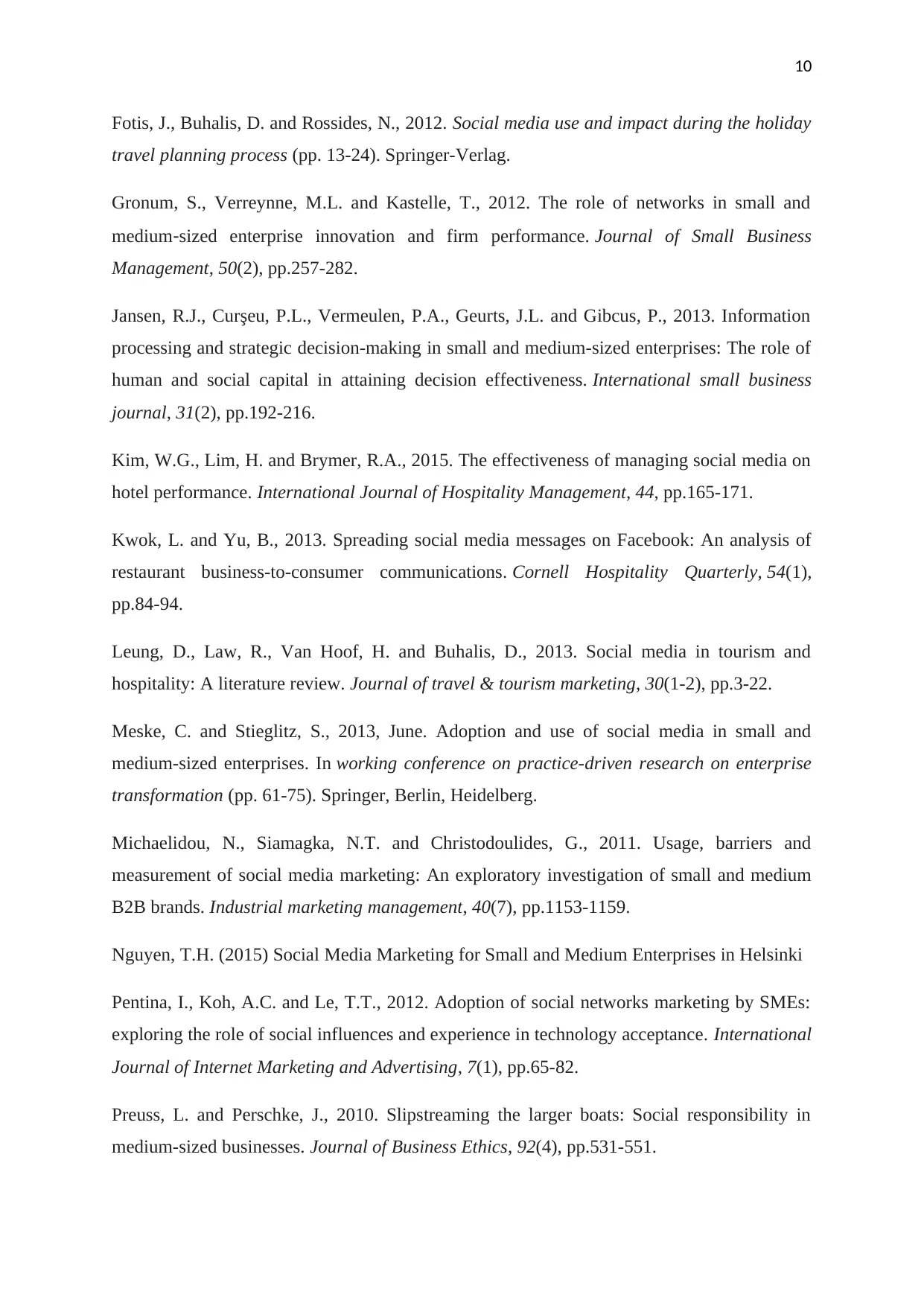
10
Fotis, J., Buhalis, D. and Rossides, N., 2012. Social media use and impact during the holiday
travel planning process (pp. 13-24). Springer-Verlag.
Gronum, S., Verreynne, M.L. and Kastelle, T., 2012. The role of networks in small and
medium‐sized enterprise innovation and firm performance. Journal of Small Business
Management, 50(2), pp.257-282.
Jansen, R.J., Curşeu, P.L., Vermeulen, P.A., Geurts, J.L. and Gibcus, P., 2013. Information
processing and strategic decision-making in small and medium-sized enterprises: The role of
human and social capital in attaining decision effectiveness. International small business
journal, 31(2), pp.192-216.
Kim, W.G., Lim, H. and Brymer, R.A., 2015. The effectiveness of managing social media on
hotel performance. International Journal of Hospitality Management, 44, pp.165-171.
Kwok, L. and Yu, B., 2013. Spreading social media messages on Facebook: An analysis of
restaurant business-to-consumer communications. Cornell Hospitality Quarterly, 54(1),
pp.84-94.
Leung, D., Law, R., Van Hoof, H. and Buhalis, D., 2013. Social media in tourism and
hospitality: A literature review. Journal of travel & tourism marketing, 30(1-2), pp.3-22.
Meske, C. and Stieglitz, S., 2013, June. Adoption and use of social media in small and
medium-sized enterprises. In working conference on practice-driven research on enterprise
transformation (pp. 61-75). Springer, Berlin, Heidelberg.
Michaelidou, N., Siamagka, N.T. and Christodoulides, G., 2011. Usage, barriers and
measurement of social media marketing: An exploratory investigation of small and medium
B2B brands. Industrial marketing management, 40(7), pp.1153-1159.
Nguyen, T.H. (2015) Social Media Marketing for Small and Medium Enterprises in Helsinki
Pentina, I., Koh, A.C. and Le, T.T., 2012. Adoption of social networks marketing by SMEs:
exploring the role of social influences and experience in technology acceptance. International
Journal of Internet Marketing and Advertising, 7(1), pp.65-82.
Preuss, L. and Perschke, J., 2010. Slipstreaming the larger boats: Social responsibility in
medium-sized businesses. Journal of Business Ethics, 92(4), pp.531-551.
Fotis, J., Buhalis, D. and Rossides, N., 2012. Social media use and impact during the holiday
travel planning process (pp. 13-24). Springer-Verlag.
Gronum, S., Verreynne, M.L. and Kastelle, T., 2012. The role of networks in small and
medium‐sized enterprise innovation and firm performance. Journal of Small Business
Management, 50(2), pp.257-282.
Jansen, R.J., Curşeu, P.L., Vermeulen, P.A., Geurts, J.L. and Gibcus, P., 2013. Information
processing and strategic decision-making in small and medium-sized enterprises: The role of
human and social capital in attaining decision effectiveness. International small business
journal, 31(2), pp.192-216.
Kim, W.G., Lim, H. and Brymer, R.A., 2015. The effectiveness of managing social media on
hotel performance. International Journal of Hospitality Management, 44, pp.165-171.
Kwok, L. and Yu, B., 2013. Spreading social media messages on Facebook: An analysis of
restaurant business-to-consumer communications. Cornell Hospitality Quarterly, 54(1),
pp.84-94.
Leung, D., Law, R., Van Hoof, H. and Buhalis, D., 2013. Social media in tourism and
hospitality: A literature review. Journal of travel & tourism marketing, 30(1-2), pp.3-22.
Meske, C. and Stieglitz, S., 2013, June. Adoption and use of social media in small and
medium-sized enterprises. In working conference on practice-driven research on enterprise
transformation (pp. 61-75). Springer, Berlin, Heidelberg.
Michaelidou, N., Siamagka, N.T. and Christodoulides, G., 2011. Usage, barriers and
measurement of social media marketing: An exploratory investigation of small and medium
B2B brands. Industrial marketing management, 40(7), pp.1153-1159.
Nguyen, T.H. (2015) Social Media Marketing for Small and Medium Enterprises in Helsinki
Pentina, I., Koh, A.C. and Le, T.T., 2012. Adoption of social networks marketing by SMEs:
exploring the role of social influences and experience in technology acceptance. International
Journal of Internet Marketing and Advertising, 7(1), pp.65-82.
Preuss, L. and Perschke, J., 2010. Slipstreaming the larger boats: Social responsibility in
medium-sized businesses. Journal of Business Ethics, 92(4), pp.531-551.
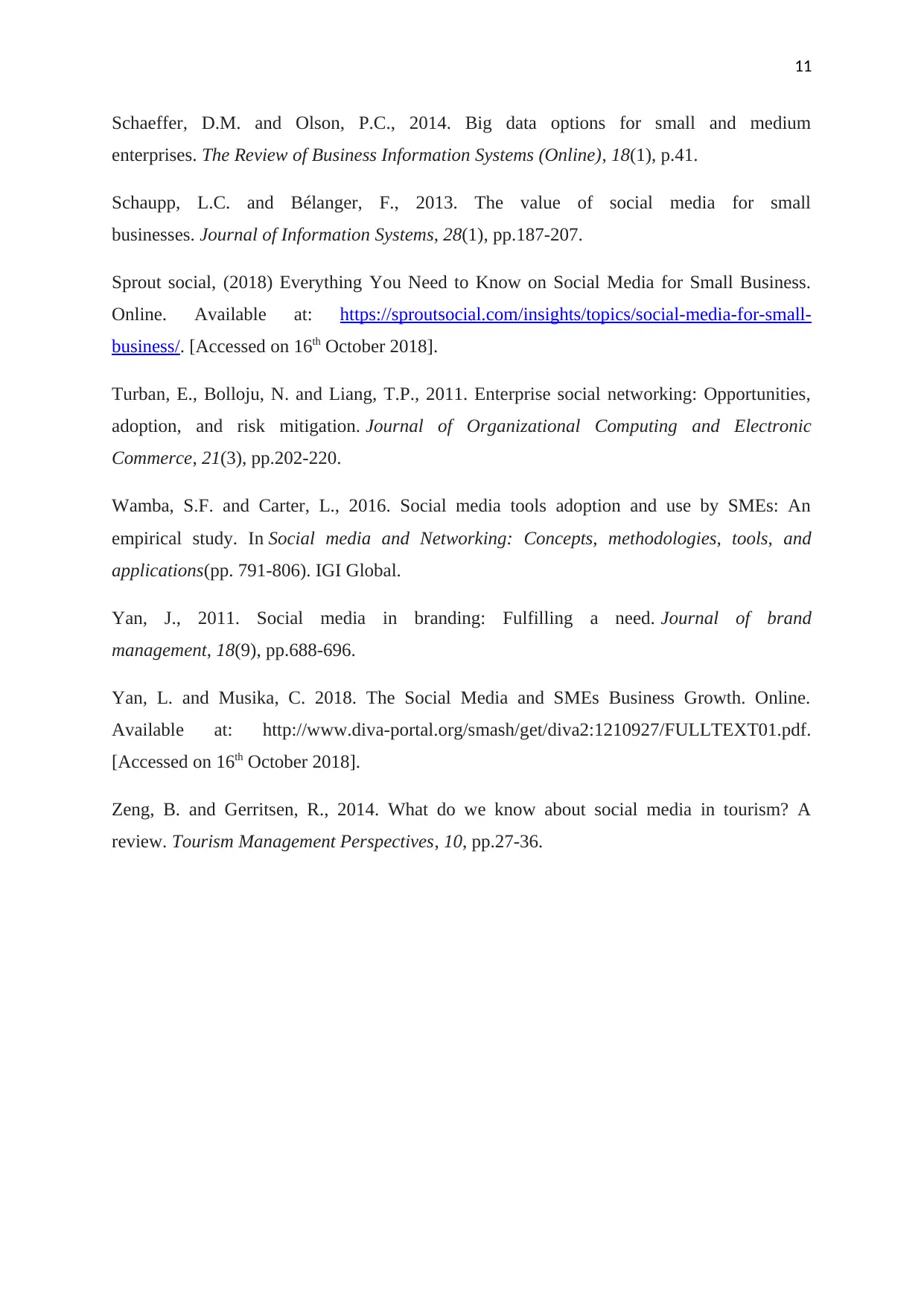
11
Schaeffer, D.M. and Olson, P.C., 2014. Big data options for small and medium
enterprises. The Review of Business Information Systems (Online), 18(1), p.41.
Schaupp, L.C. and Bélanger, F., 2013. The value of social media for small
businesses. Journal of Information Systems, 28(1), pp.187-207.
Sprout social, (2018) Everything You Need to Know on Social Media for Small Business.
Online. Available at: https://sproutsocial.com/insights/topics/social-media-for-small-
business/. [Accessed on 16th October 2018].
Turban, E., Bolloju, N. and Liang, T.P., 2011. Enterprise social networking: Opportunities,
adoption, and risk mitigation. Journal of Organizational Computing and Electronic
Commerce, 21(3), pp.202-220.
Wamba, S.F. and Carter, L., 2016. Social media tools adoption and use by SMEs: An
empirical study. In Social media and Networking: Concepts, methodologies, tools, and
applications(pp. 791-806). IGI Global.
Yan, J., 2011. Social media in branding: Fulfilling a need. Journal of brand
management, 18(9), pp.688-696.
Yan, L. and Musika, C. 2018. The Social Media and SMEs Business Growth. Online.
Available at: http://www.diva-portal.org/smash/get/diva2:1210927/FULLTEXT01.pdf.
[Accessed on 16th October 2018].
Zeng, B. and Gerritsen, R., 2014. What do we know about social media in tourism? A
review. Tourism Management Perspectives, 10, pp.27-36.
Schaeffer, D.M. and Olson, P.C., 2014. Big data options for small and medium
enterprises. The Review of Business Information Systems (Online), 18(1), p.41.
Schaupp, L.C. and Bélanger, F., 2013. The value of social media for small
businesses. Journal of Information Systems, 28(1), pp.187-207.
Sprout social, (2018) Everything You Need to Know on Social Media for Small Business.
Online. Available at: https://sproutsocial.com/insights/topics/social-media-for-small-
business/. [Accessed on 16th October 2018].
Turban, E., Bolloju, N. and Liang, T.P., 2011. Enterprise social networking: Opportunities,
adoption, and risk mitigation. Journal of Organizational Computing and Electronic
Commerce, 21(3), pp.202-220.
Wamba, S.F. and Carter, L., 2016. Social media tools adoption and use by SMEs: An
empirical study. In Social media and Networking: Concepts, methodologies, tools, and
applications(pp. 791-806). IGI Global.
Yan, J., 2011. Social media in branding: Fulfilling a need. Journal of brand
management, 18(9), pp.688-696.
Yan, L. and Musika, C. 2018. The Social Media and SMEs Business Growth. Online.
Available at: http://www.diva-portal.org/smash/get/diva2:1210927/FULLTEXT01.pdf.
[Accessed on 16th October 2018].
Zeng, B. and Gerritsen, R., 2014. What do we know about social media in tourism? A
review. Tourism Management Perspectives, 10, pp.27-36.
⊘ This is a preview!⊘
Do you want full access?
Subscribe today to unlock all pages.

Trusted by 1+ million students worldwide
1 out of 12
Related Documents
Your All-in-One AI-Powered Toolkit for Academic Success.
+13062052269
info@desklib.com
Available 24*7 on WhatsApp / Email
![[object Object]](/_next/static/media/star-bottom.7253800d.svg)
Unlock your academic potential
Copyright © 2020–2026 A2Z Services. All Rights Reserved. Developed and managed by ZUCOL.




